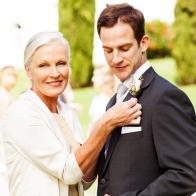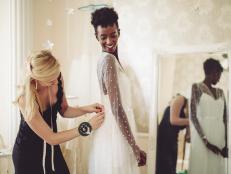8 Tips for Planning an Interfaith Wedding Ceremony
How to create the perfect blend.

Related To:

Photo By: FG Trade
Photo By: 10'000 Hours
Photo By: Arne Trautmann / EyeEm
Photo By: Yuttana Jaowattana / EyeEm
Photo By: FG Trade
Photo By: Giacomo Augugliaro
Photo By: Darshan Rupapara / EyeEm
Photo By: Zhang Zheng
Photo By: lovro77
Pull Off a Perfectly Blended Wedding
Planning the details of your wedding ceremony can include the most intimate decisions a couple makes before their big day. The ceremony symbolizes many things, like the coming together of two individuals who are vowing to spend their lives together. For some couples, bringing in religious traditions and customs makes the ceremony more personal and meaningful. Even if you and your fiancé are of different religions, you can still bring the two faiths together and create a blended wedding ceremony. Here are eight tips for when you’re planning an interfaith wedding ceremony.
Have an Open Conversation With Both Families
Start the ceremony planning process by having an open conversation with both of your families. Chat about any family wedding traditions or religious customs that would mean a lot to you and/or your loved ones. If some of these traditions or customs are new to you, ask about the meaning behind them to learn more about their importance.
Talk to Your Religious Leaders
Find religious leaders who are comfortable officiating an interfaith wedding. There are some out there that will list if they've done a multi-religion wedding in their bio or on their website. Once you’ve found your leaders, have a meeting to see how they’d prefer to work together during the ceremony (whether it’s taking turns or splitting the ceremony in half) to make sure it goes smoothly.
Decide What Traditions You Want Present
After chatting with family and religious leaders, you might feel overwhelmed by all the traditions from both of your religions that you want to incorporate. Decide what customs matter to you and which you’re comfortable including. In the end, your ceremony should be what you want it to be and include what means the most to you.
Bring Music, Food, Fashion and Other Customs to the Ceremony
Break away from the traditional setting of a wedding ceremony and include music, food, fashion–a wardrobe change even–and other religious customs in the celebration. Start by deciding what the length of your ceremony will be and then include extra experiences that fall within that timeline. For example, you can pass out a traditional food during cocktail hour if it has a special meaning, or you can have your religious leaders play a song at the start to welcome guests as they arrive.
Share Information with Guests in the Program
Let your guests in on the history and meaning behind your wedding ceremony’s religious traditions and customs. Include information and stories inside of the program so that all guests can get educated on what they will experience when the ceremony starts and feel engaged throughout.
Consider Mini Ceremonies During the Wedding Weekend
Some religions might have certain ceremonies or traditions that happen outside of just the main ceremony. If that’s the case, incorporate those customs into your wedding weekend by deciding who you’d like to include for each event and share the itinerary. Loop in your wedding coordinator or share the details on your wedding website so that everyone included can have a clear timeline for each ceremony or tradition.
Practice the Flow of the Ceremony Before the Big Day
Spend time outlining the flow of how the whole thing will play out, from who will read what passage to who will help with what tradition. Schedule everything and do at least two rehearsals–one with both religious leaders if possible. That way, everyone involved will know what to do and how the ceremony will look on the big day.
Dive into Each Other’s Religions and Traditions Before the Big Day
Get extra excited about the upcoming wedding by creating date nights based on the traditions, history or even personal memories of growing up with your religion. That way, you can have special ways for your partner to get a better idea and understanding of your religion before they experience some of the customs during the ceremony.






































































